Most would wonder about preschool teacher soft skills for 2023: What are the essential skills for a preschool teacher? After all, the world of early childhood education has changed drastically over the past few years. Technology and new research have transformed how we interact with our youngest students, so staying up-to-date on what works in the classroom is essential. When it comes to preschool teaching, soft skills are essential.
Parents often watch for teachers demonstrating strong communication, empathy, problem-solving skills, and creativity. These soft skills will be even more important in the coming years as preschoolers will be exposed to more advanced concepts and techniques. This article will look at some essential soft skills every preschool teacher should cultivate and some tips for applying those skills in the classroom.
What Is Early Childhood Education?
Preschooler Cutting a Craft Paper – Preschool Teacher Soft Skills
Early childhood education or preschool education, in other words, is the foundation for a child’s development and learning in later life. It focuses on helping children learn and grow during their formative years, ages 0-6. Research has proven that early intervention in literacy and math helps to set students up for success as they enter elementary school.
When it comes down to shaping children’s skills, preschool teachers play a vital role. The more prepared and passionate teachers are, the more likely their students will succeed. Preparing for preschool teaching involves more than just knowing how to teach reading and math; it requires a unique set of soft skills that all educators should work hard to master.
Importance of Soft Skills in Preschool Teaching
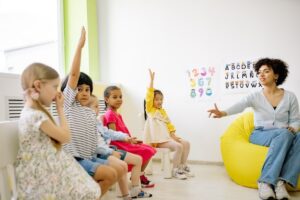
Preschool teachers are essential in providing children with the necessary tools to excel in their academic careers. With the right tools and skills for teachers, much learning can occur in the classroom. Essential Soft Skills for Preschool teachers must be able to adjust quickly and think on their feet, as no two days are ever the same.
To foster effective learning environments, preschool teachers must be able to think outside of the box and create innovative ways to engage their students. Soft skills are especially helpful for preschool teachers in communication, patience, problem-solving, and creativity. The most successful preschool teachers have the following soft skills in teaching. Let’s look at some benefits of soft skills in preschool teaching.
Types of Preschool Teacher Soft Skills
The following are the essential soft skills for preschool teachers:
Communication
Being able to communicate with students, parents, and colleagues is key to successful teaching. This includes speaking in a clear voice, using age-appropriate language, and setting appropriate boundaries.
Organization
Preschool teachers need to stay organized and manage their time efficiently. This includes planning lessons, keeping track of student progress, and maintaining a neat and tidy classroom environment.
Patience
Working with young students requires patience. A good preschool teacher will have the ability to remain calm even in challenging situations.
Creativity
Preschoolers need to be engaged in their learning. Teachers should be able to think outside the box and come up with fun activities that will capture their students’ attention as well as help them learn.
Problem-Solving
Problem-solving is essential for any teacher, especially for preschoolers, who can be easily distracted. A good preschool teacher needs to be able to think on their feet and come up with creative solutions to keep their students engaged.
Empathy
Besides being patient, teachers should strive to show empathy towards their students. This includes understanding where children are coming from and being sensitive to their needs.
Using Soft Skills in the Classroom

Now that we have discussed the importance of soft skills for preschool teachers let’s look at how these skills can be used in the classroom. Here are some tips for using soft skills to create a thriving learning environment:
- Establish Goals– Setting students’ expectations is key to keeping them on track. Teachers can help students stay motivated and focused on their learning by creating achievable goals.
- Communicate– Communication is crucial in any classroom, especially preschool classrooms. Teachers should ensure they speak clearly and use age-appropriate language when communicating with their students.
- Be Flexible– Preschoolers can be unpredictable, so teachers need to be flexible. Thinking on their feet and adjusting activities quickly can help preschoolers stay engaged in their learning.
- Encourage Creativity– Giving children the opportunity to express themselves creatively is essential for their development. Teachers should encourage this exploration through music, art, and imaginative play.
- Model Positive Behavior– As role models, teachers should strive to lead by example. The teacher should always model positive behavior so that students are encouraged to do the same.
- Show Compassion- Preschool teachers must show compassion and understanding for their students. This includes being patient, listening to their feelings, and empathizing with them when necessary.
Practical Examples of Soft Skills in Preschool Teaching
- Suppose you are a preschool teacher, and one of your students has difficulty following instructions. You can use your soft skills to manage this situation as a teacher. First, you should speak to the student calmly and reassuringly and explain why it is important for them to follow instructions. If they still have trouble, consider breaking down the instructions into smaller, more manageable tasks. You can also offer positive reinforcement for their efforts and reward them for good behavior.
- Another example of how soft skills can be helpful in the classroom is when students have trouble controlling their emotions. In this case, the teacher should take the time to talk to the student and find out what might be causing them to feel upset. Once the cause has been identified, teachers can then work with the student to find a solution that is both calming and constructive.
- Another Instance can be when a student is having trouble with a task. Instead of getting frustrated or giving up, the teacher should use their soft skills to solve the problem. This could include breaking down the task into smaller steps, offering positive reinforcement and encouragement, and providing additional guidance if necessary.
- In a situation where a student comes from a troublesome background, a teacher can use their soft skills to create an environment of respect and understanding. They could do this by regularly conversing with the student about their home life and providing emotional support when needed. In other words, to be a mentor to the student.
How to Develop Soft Skills for Preschool Teaching?
It can be daunting to start using soft skills in the classroom, but luckily, teachers can do a few things to build their confidence and develop their soft skills.
- Practice Self-Awareness– It’s important for teachers to be aware of their feelings and reactions to understand those of their students better. Taking a moment to step back and reflect on their behavior can help teachers be more mindful of the needs of their students.
- Ask for Feedback- It’s helpful to solicit feedback from others, such as fellow teachers or administrators, who can provide insight into how teachers interact with their students. This feedback can be invaluable in helping teachers to identify areas that need improvement.
- Develop a Support Network- Building relationships with other professionals in the field can benefit personal growth and development. These connections can provide guidance and advice on improving soft skills when needed.
- Embrace Learning Opportunities- Seeking professional development opportunities is another way to hone soft skills. For instance, attending workshops or seminars on communication and problem-solving can be beneficial in developing the necessary skills needed to interact effectively with students.
- Allow Time for Critical Thinking- It’s important for students to think and problem-solve independently. This can help them develop critical thinking skills as well as foster independence. Using these strategies, teachers can build their soft skills and create a classroom environment conducive to learning and growth. With patience and practice, teachers will be able to
- Encourage Pretend Play- Pretend play is important to a preschooler’s development. It can help them develop social and problem-solving skills, practice language use, and express themselves creatively. Teachers should encourage pretend play whenever possible by providing props such as dress-up clothes or puppets. They should also actively participate in the game if the children invite them to join in.
- Let Students Interact with Each Other While Playing- Teachers should provide props for pretend play and allow the students to interact and problem-solve independently. This could involve working together to build a fort or deciding how to divide up a pile of toys.
- Let Students Make Mistakes- Making mistakes is essential to the learning process. Teachers must provide a safe environment where students can take risks and make mistakes without fear of repercussions. This could involve allowing students to choose their materials for a project or creating creative solutions to solve problems.
FAQs Related to Preschool Teaching Soft Skills
What Are the Soft Skills of a Nursery Teacher?
The soft skills for a nursery teacher include patience, empathy, communication, interpersonal skills, problem-solving skills, and conflict resolution.
How Can I Develop Soft Skills in a Preschool?
Developing soft skills in preschool can be done by practicing self-awareness, asking for feedback from colleagues or administrators, building relationships with other professionals in the field, and embracing learning opportunities. Additionally, teachers can encourage pretend to play, let students interact with each other while playing, and allow them to make mistakes without fear of repercussions.
How Can Parents Help Develop Soft Skills in Preschoolers?
Parents can help develop soft skills in preschoolers by modeling positive behavior, providing a safe environment for exploration and risk-taking, encouraging creative thinking, playing, and spending quality time with their children. Engaging in cooperative activities. Additionally, parents should avoid toxic parenting styles and follow a good parenting style to guide their preschoolers without causing tension in and around their environment.
Is It Possible to Develop Skills in Young Children?
Yes, it is possible to develop soft skills in young children. Parents and teachers together can craft a safe and supportive learning environment where children can practice essential soft skills.
Can Soft Skills Be Assessed in Preschoolers?
Soft skills in preschoolers can be observed and assessed through conversations, observations of their interactions with others, and assessments of their other abilities. Additionally, caregivers and teachers can observe how children handle difficult situations and interact with other students. This provides valuable insight into the development of soft skills in young children.
Get Involved With Your Children
Knowing the students and their families more personally can help build trust. Teachers should get to know their students and families by talking with them, attending school events, or volunteering for after-school activities. This can help create a deeper connection and understanding, benefiting the teacher and student.
Now that you understand the importance of soft skills in preschool education, it’s time to start implementing them in your classroom. With practice and patience, these strategies can create a more positive learning environment and foster student success.
Good luck!

